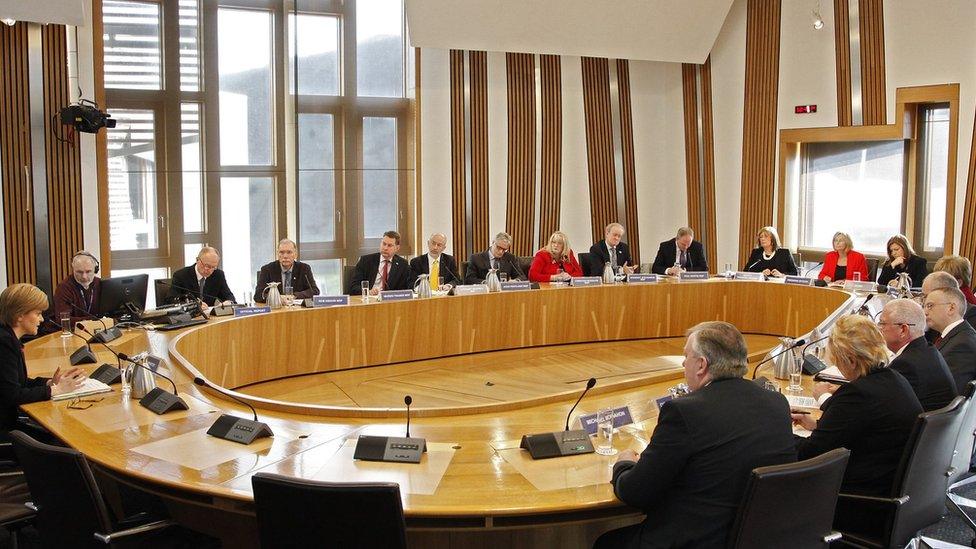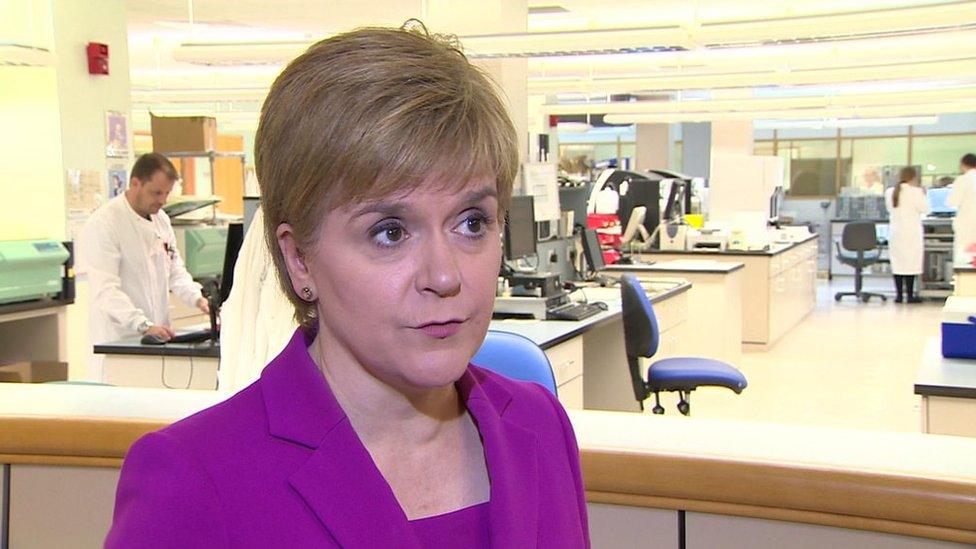Holyrood aide rules changed over conflict of interest fears
- Published

PLOs will no longer be able to sit on Holyrood committees scrutinising the ministers they work for
MSPs who act as aides to Scottish government ministers will no longer be able to sit on committees which scrutinise their bosses.
First Minister Nicola Sturgeon announced a change to the ministerial code after opposition MSPs raised concerns about conflicts of interest.
Parliamentary liaison officers will now not be able to take part in committees concerning their minister's portfolio.
The move was welcomed by opposition parties as "the right decision".
Parliamentary liaison officers (PLOs) are MSPs appointed to assist ministers with their duties, and to act as a link between parliament and government.
When the current team was set up, a PLO working for each of the government's cabinet secretaries was also appointed to the committee tasked with scrutinising the relevant minister's work.
In practice, this could see the aides tasked with questioning their own minister during committee sessions.
Each of Holyrood's opposition parties raised concerns about what they referred to a "stitch up" and an attempt to "stack" Holyrood's committees with government "cheerleaders".
When these concerns were first raised, a spokesman for the SNP dismissed them as "hysteria", saying the responsibilities held by aides would "in no sense" prevent them from properly scrutinising the government.
'Propriety and transparency'
Ms Sturgeon has now decided that the system should be changed - although she stressed that there was "no evidence of any conflict of interest".
She said it was important that aides could carry out their work "with the full confidence of both ministers and the parliamentary committees on which they serve".
She continued: "I believe that the parliamentary liaison officers who are currently in post fulfil that requirement admirably, and there has been no evidence of any conflict of interest.
"At the same time, I have listened carefully to the case made by those calling for change, and so the updated guidelines I am publishing today will remove even the perception of any conflict of interest in the role of PLOs.
"The change is part of the updated Ministerial Code, which sets the highest standards of propriety and transparency for Scottish government ministers. I will continue to lead by example in following the letter and spirit of this code, and I expect that all ministers will do likewise."

Ms Sturgeon said the changes would remove "even the perception" of any conflict of interest
The move brings Holyrood's codes into line with those at Westminster, where parliamentary private secretaries - the equivalent of the devolved parliament's PLOs - are not allowed to sit on committees scrutinising their ministers.
The change was welcomed by opposition parties.
The four Scottish Conservative committee conveners all wrote to Ms Sturgeon demanding a change to the rules, and justice committee head Margaret Mitchell said she was glad the first minister had "seen sense".
She added: "Serving on a committee that scrutinises your boss is a clear conflict of interest, and in the interests of the integrity of the parliament the situation had to change.
"Robust scrutiny is an absolute necessity within the parliament's committee system. However it is deeply concerning that the SNP thought it was acceptable for these PLOs to be on committees in the first place."
Scottish Labour leader Kezia Dugdale also wrote to Ms Sturgeon urging a change, and the party's MSP James Kelly, who had vowed to raise the matter with Holyrood's parliamentary bureau, said it was the "right decision".
He added: "It should not have taken pressure from Labour to make the government see sense. An assistant to a cabinet minister cannot provide the type of scrutiny that government departments need and which committees should deliver. These PLOs would in effect have been scrutinising themselves."
'Persistent pressure'
Patrick Harvie of the Scottish Greens also welcomed Ms Sturgeon's decision.
He said: "Over recent years it has become all too common to see MSPs who work directly for ministers sitting as members of the committees which are supposed to hold them to account, raising a clear conflict of interests.
"It has taken persistent pressure to challenge this practice, and I am pleased to see that Nicola Sturgeon has finally agreed to end it.
"When the public sees parliament questioning ministers about new laws, policy or public spending, it's essential that they can have confidence that MSPs are holding ministers to account, not the other way round."
Mike Rumbles of the Scottish Liberal Democrats also said the government had been "shamed" into a u-turn.
He said: "The idea that a Parliamentary Liaison Officer should help brief their Minister for a committee hearing before crossing the floor and asking questions of them is patently ludicrous.
"The fact that the SNP had to be shamed into taking this basic step to preserve the independence of the committee system speaks volumes about their attitude to transparency and accountability."